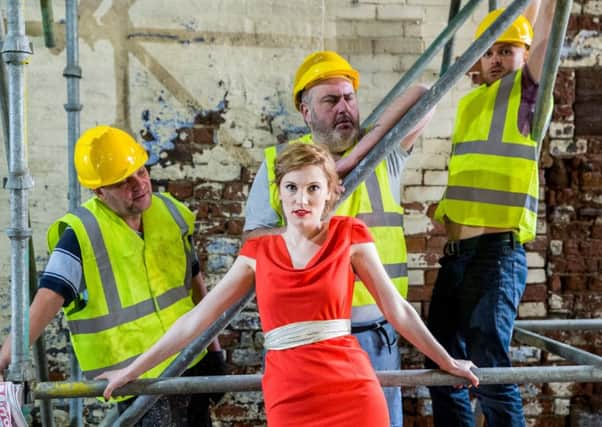New play explores the gap between two different worlds


Poles Apart features a pole-dancing Pole who erects poles for a living – which explains why Godber is at a pole-dancing class with the cast when we catch up.
Pole dancing? Isn’t this play about scaffolding?
“One of the themes of the play is that Jan, the Polish scaffolder, is very physically fit. Part of his routine when they are putting up the scaffolding in the street is that he swings from the scaffolding and he can use it to show off his physique. We’re at the pole dancing class so that Frazer can become familiar with how he can use his physique in the play to demonstrate his skills.”
Tell me about the inspiration for this latest play?
Advertisement
Hide AdAdvertisement
Hide Ad“This play was commissioned by a bloke called David Pugh, who is a very influential theatre producer, he’s produced The Calendar Girls and The Full Monty, he’s also producing the Gary Barlow musical The Girls at the moment, and he had been affected by having scaffolders working outside his theatre in London, they were really getting on his nerves. At the same time I think he was very taken by their physical abilities and the masculinity of putting the poles up, and that’s where the idea came from. On the one hand you have people making plays with intellect, if you like, and scaffolders are the exact opposite. They are building things with their physicality, that’s where the Poles Apart title comes from. It’s a divide between those who work physically and those who work with their minds.”
So who do we meet in this story? What happens?
The story is told by and is about these three burly scaffolders, played by Adrian Hood, Frazer Hammill and Keith Hukin. They essentially rant about life and sausage sandwiches, but as they are erecting scaffolding at a theatre, they clash with the theatre manager and the leading lady Abi.”
It’s a theme you’ve tackled a lot in your work, plays about plays – you’re also looking at another preoccupation – the role of theatre in the life of the working man. What is that role? Is theatre really that important to ‘the working man’?
“Well I think theatre is important, full stop, and I’m bound to say that because I’m involved with it. The working man generally doesn’t go to the theatre, and that’s for a million reasons, even though I’ve tried to demystify what theatre-going is over time. But what this play looks at is actually ‘what are plays and how do they affect us?’ and ‘are making plays just as important as putting up scaffolding?’.
Advertisement
Hide AdAdvertisement
Hide AdThey are both skilled jobs and we shouldn’t be surprised if the people who put up the scaffolding don’t like the theatre and if the people who work at the theatre don’t like the scaffolders.
But in this play the two teams come together and in a strange way try to understand each other and come to some kind of mutual respect.”
You’ve been running your own company, producing alongside Wakefield Theatre Royal for a little while now – what’s next for the John Godber Company?
“Well next year Jane [Thornton, Godber’s playwright wife] and I are going to tour Shafted. After the little taster we did this year was such a big success. But more important at the moment is to make sure this play goes well.”